Six-Day War Day 1 – War Begins
Reliving Israel’s Victory with a 6-Part Series of the Day-by-Day Action

Note: This post is the first in our daily re-created coverage of the Six-Day War. Starting Monday June 5 and concluding on Saturday June 10, we will cover each night the war as the events happened in 1967. For a prelude, see 50th Anniversary of Six-Day War: The Eve of War.
In the early morning hours of June 5, Israel launched an aerial strike on Egyptian air force bases.
The attack was in response to the huge dangers that the country has faced in recent weeks—at least 200,000 Arab troops and some 1,000 tanks massed at its border—and the Soviet-backed Egyptian leader Gamal Abdel Nasser’s ongoing provocations.
Israel has finally come to terms with Egypt’s threat to destroy it.
But, despite best efforts to keep Syria, Jordan and other Arab countries out of the war, they’ve foolishly joined Nasser’s bandwagon. Israel has now been drawn into a war on three fronts and faces the combined forces of five armies.
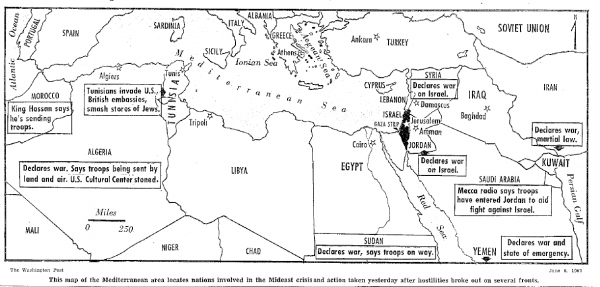
[credit: Washington Post]
Israel’s government finally authorizes the IDF to break the noose surrounding the country
For weeks Israel’s government and its military commanders have debated, agonized, and hesitated as they’ve struggled to make sense of the unfolding events in Egypt and Syria.
There was deep anxiety and ambivalence over this waiting around—some military commanders were convinced it was eroding Israel’s war-fighting capacity. The public was also growing increasingly impatient with the indecision, but Israel’s leaders were resigned to give diplomacy a chance to work.
Yesterday the newly installed unity government at last came to the realization that the country was in too grave a danger. It could no longer wait for a dithering and feckless international community to reign in the Arab state aggressors.
50 years ago Israel formed a National Unity #Goverment for the 1st time in #History #OnThisDay #SixDayWar #politics pic.twitter.com/N0oua71XLs
— Then & Now 1967-2017 (@ThenandNow67) June 1, 2017
PM Levi Eshkol—among the last holdouts—stated that war was inevitable on account of the signing of the military defense pact between Egypt and Jordan. For him, this was the last straw.
It convinced him that diplomacy had failed.
It also made the full scope of Arab military preparations to drive the Jews into the sea crystal clear.
The decision to launch today’s defensive strike was taken in a secret full-cabinet meeting, which voted 12-2 for military action.
4.6.67 Cabinet vote in favour of our military strike passed by 12-2. The air force will strike at 7:00 am tomorrow morning. #sixdaywar
— Moshe Dayan on TW (@MosheDayan67) June 4, 2017
"The government resolves to take military action in order to liberate #Israel" #OTD #OnThisDay #SixDayWar #Jerusalem pic.twitter.com/50BJeL92P4
— Six Day War Quotes (@SixDayWarQuotes) June 4, 2017
PM Eshkol described it as a “war of no choice”. But no one would know about it until the following morning—when most of the Egyptian air force lay in ruins on the tarmacs.
“Never have so few pilots downed so many planes in such a short period of time”
At 7:15am every military jet in the Israeli Air Force (except for a reserve of a mere 12 to guard Israel’s airspace) reportedly took off, flying low to avoid radar detection and observing complete radio silence.
Today marks the start of the #SixDayWar in #Israel. 50 years ago #Israel fought against all odds battling all of its neighbors. #OnThisDay
— Menachem Begin on TW (@BeginTweets) June 5, 2017
Military intelligence knew that the Egyptians mounted patrols from first light until 7:00am. So at 7:45 the pilots would all be back in their bases having breakfast; senior commanders living off base wouldn’t have yet arrived either. So 7:15 was the perfect time to shed camouflage netting and cross into the Sinai.
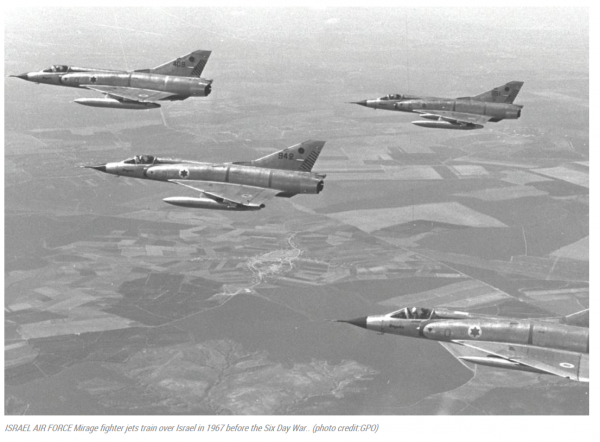
It was a brilliant ploy.
A quite deservedly buoyant PM Eshkol informed the legislature that 374 airplanes were either destroyed on the ground or shot out of the air. Eleven runways were also incapacitated. Only 19 IAF planes were reportedly downed (Major General Hod has broadcast that the 19 pilots were also lost).
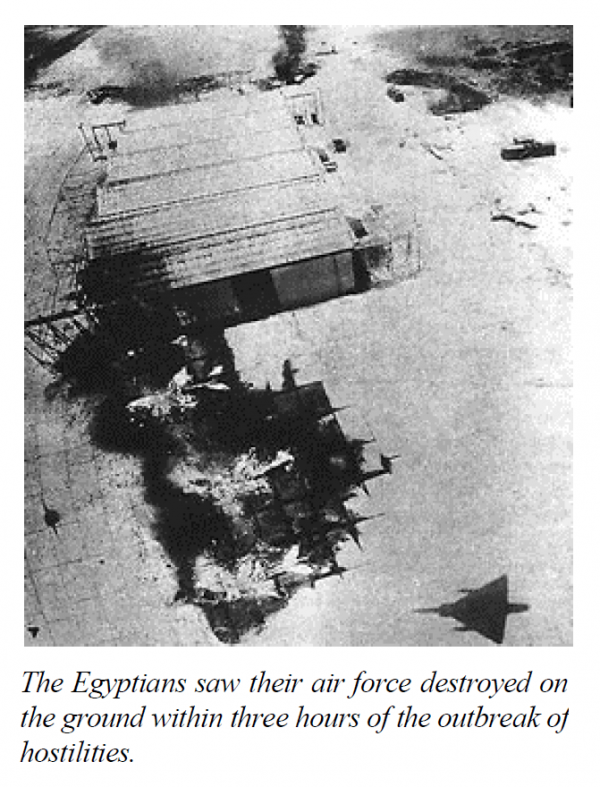
[Credit: Middle East Forum]

![]()
But now we’re getting word that Israel’s French-built Mirage and Mystere jets are also bombing and strafing Jordanian and Syrian airfields where they’re meeting little antiaircraft fire or interception.
Both the Jordanians and the Syrians failed to heed Israel’s final offers: if you stay out of the war, we won’t retaliate.
Syria and Jordan must be operating with some grossly inaccurate assessments from the battlefield. The Egyptians are undoubtedly the ones feeding them this disinformation.
Colleagues based in Cairo tell me that the Egyptians are claiming massive and successful attacks inside Israel, boasting on the radio that they’ve lost only 2 airplanes while downing 161 Israeli planes, and that their armor is now thrust into Israel halfway down the Sinai border between the two countries!
We have a sneaking suspicion that Jordan and Syria will live to regret believing these bogus tidings of victory from their manipulative Egyptian ally.
So far The Washington Post isn’t disconfirming the Egyptian reports, but we can be fairly certain they’re fake because of the absence of Egyptian bombing in Tel Aviv, clear evidence that Israel has in fact destroyed a substantial part of Egypt’s air force.
The Washington Post reports:
One of the most striking features of the day has been the virtual absence of Arab aircraft over the populated portion of Israel north of the Negev Desert. As far as could be determined, no Egyptian bombers whatsoever penetrated the airspace above Israeli cities and only a handful of Syrian and Jordanian places found their way through…the low intensity of air attacks, accordingly, suggested that the Israeli Air Force had indeed spectacularly succeeded in what was obviously its prime mission: neutralization of Egyptian and other Arab air forces, numerically superior to that of Israel itself.”
So one day in, it looks like Egypt is already losing this war.
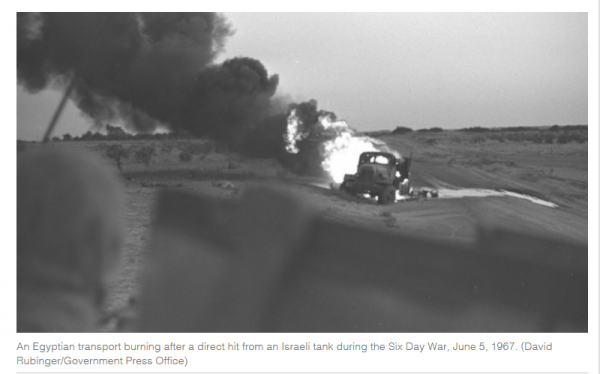
Our hot take: the Egyptian people, now dancing in the streets, are soon going to be in for a colossal letdown:
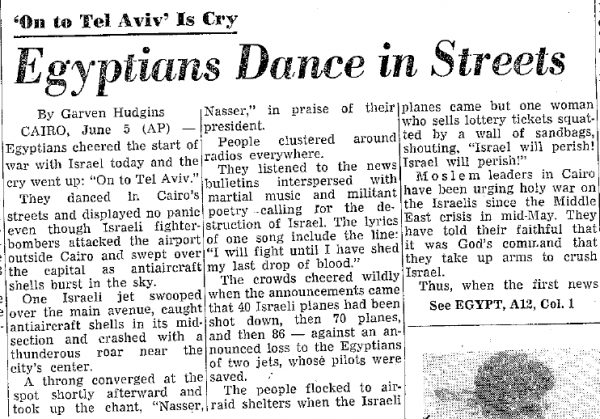
[credit: Washington Post]
In Jerusalem, fire is heavy
Israel implored Jordan to stay out of the war on three separate occasions today.
Jordan has forced our hand. We had sought to avoid war, but Hussein has attacked in Jerusalem and Tel Aviv. No choice but to respond
— Moshe Dayan on TW (@MosheDayan67) June 5, 2017
After success in Sinai and Jordanian assault in Jerusalem, ordered paratroops redeployed from Sinai to Jerusalem. #sixdaywar
— Moshe Dayan on TW (@MosheDayan67) June 5, 2017
The King would’ve done well to comply.
If he did it would’ve meant that the Western Wall, the ancient synagogues of the Old City, and the Temple Mount—the Jewish people’s holiest site—would continue to remain under Jordanian control, and off-limits to Jews (we hear that one needs to present the Jordanian authorities with a baptismal certificate in order to be granted access, so pervasive is their discrimination against Jews and all Israelis—even Muslims and Christians can only visit their sacred sites in east Jerusalem on Christmas Day).
But Jordan ignored Israel’s last entreaty.
It was sent at 10:30am by the Commander of the UN Observer Forces in the area, General Odd Bull, on behalf of Israel’s Foreign Ministry.
At 11:25am Jordan opened fire.
In just a few hours, thousands of mortar shells have rained down on Jewish areas in the western part of the city, hitting hundreds of civilian locations. There are many fires raging and hospitals have been hit. Mount Zion church has also suffered extensive damage from the heavy artillery fire.
Basically, because it controls the highlands of the West Bank, it can easily shell civilian targets—even all the way to Tel Aviv.
5.6.67 Fierce Jordanian assault on #Jerusalem: 6000 shells, 900 buildings damaged, 20 civilians dead, over 1000 injured.
— Foreign Journalist (@MEjournalist67) June 5, 2017
Had to perform all sorts of medical procedures today. Limbs torn off, shrapnel wounds, etc. I'm exhausted but thankful to help. #sixdaywar
— Volunteer Paramedic (@YoniCohen67) June 5, 2017
So far, 10 civilians have reportedly been killed and over 100 wounded.
Reports are coming in that the coastal cities of Netanya and Kfar Saba have also been hit. The Syrians and Iraqis have now joined in the war—Haifa’s oil refineries have been targeted. Israelis living in communities beneath the Syrian-controlled Golan Heights are spending the day in the bomb shelters (that’s not a new experience for them—they’ve been subjected to Syrian barrages for years).
The hard-fought battles in this war are likely to be on the eastern front. But will this mean that Jewish heritage will finally be liberated from an unlawful and unjust Jordanian occupation? It would require Col. Motta Gur’s reserve paratroopers and the Jerusalem Brigade to cross over into the Old City.
So far though, Jerusalem’s Old City isn’t on anyone’s agenda. Col. Gur brigade has only been redirected from the Sinai to break through to Mount Scopus.
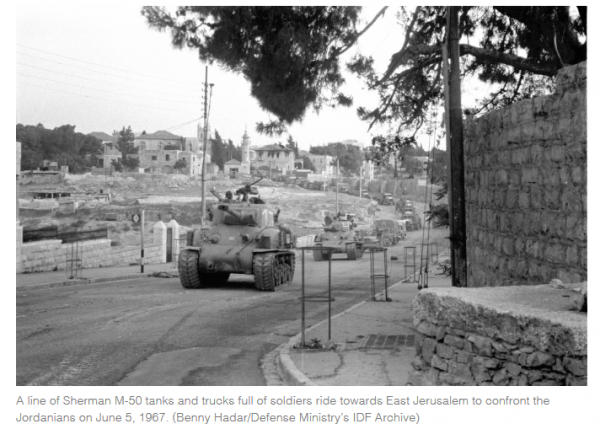
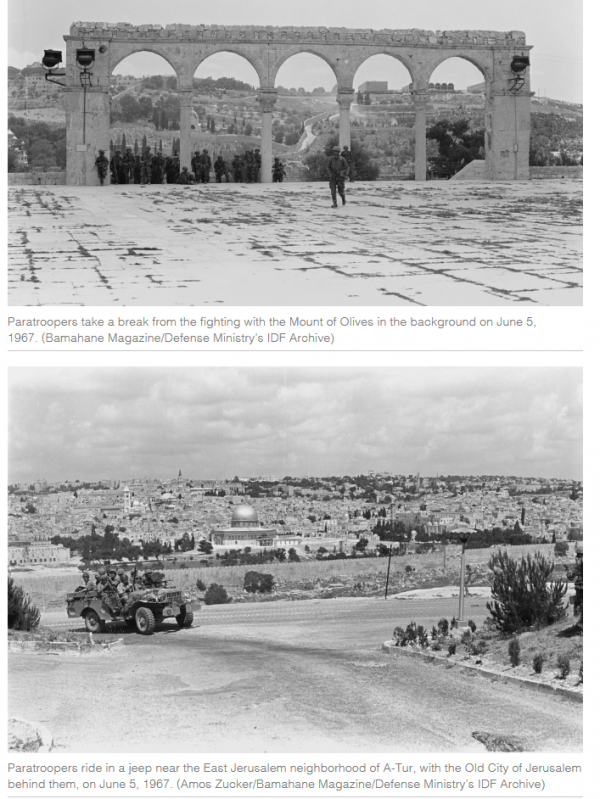
Tapped by a British TV interviewer on his way to the Knesset Assembly Hall today, PM Eshkol was asked point blank “Have you any territorial claims to make against the Arabs?”
His Answer: “None. All we want is security within our frontiers.”
These words were echoed too in a radio broadcast today by Israel’s new defense minister Moshe Dayan, the famed war hero who led Israel to victory in 1956:
Soldiers of Israel, we are not setting out for conquest. Our only aim is to frustrate the attempt of the Arab armies to conquer our country.”
No one in authority is even mentioning the Old City.

Conclusion
In the weeks before this latest outbreak in hostilities, calls to destroy Israel echoed through the Arab streets.
Vastly outnumbered and outgunned, Israel’s leaders and her people expected the worst. Public parks had been converted to mass graves. Around the world people were beginning to speak in hushed voices about the likelihood of a second Holocaust.
#Israel's strategic reality on eve of #SixDayWar 50 years ago today. pic.twitter.com/U7jnxhWtFu
— Eylon Levy (@EylonALevy) June 4, 2017
These dire predictions aren’t materializing.
The Jewish state appears to now have control of the skies. It’s also captured El-Arish—35 miles back of the southern boundary of the Gaza Strip it’s the gateway to the Sinai Peninsula; the location of one of Egypt’s largest air fields; and believed to be the northern headquarters for Egypt’s Sinai Front.

[credit: JTA]
Aerial control has allowed the armor ground troops to advance with lightning speed. Major General Ariel Sharon’s division easily succeeded in its mission to take UmTekef—an area considered the most fortified of the Egyptian arsenal in the Sinai (the massive amount of armor used for today’s battles in the Sinai was reportedly larger than that used in the critical World War II battle of El Alamein in the North African desert).
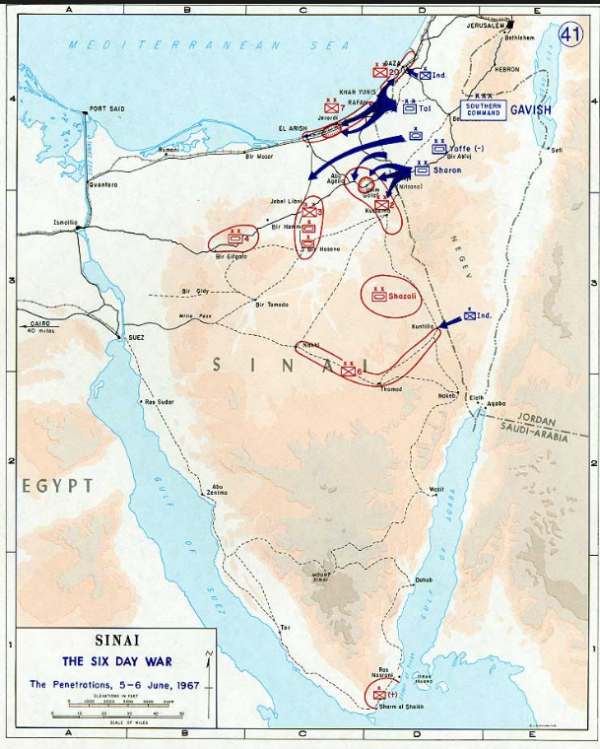
So, the battles in the Sinai (code named “Red Sheet”) went well today for the Israelis.
Still, Israel is now stretched thin on three fronts: Egypt in the south, Jordan in the east, and Syria in the north.
Particularly in the Jerusalem theater, Israel is facing a formidable enemy. The Jerusalem Brigade has now conquered Armon Hanatziv, but Jordanian shells continue to fall. At nightfall today, Jordanian artillery and small arms also remains abundant along the border north of the city, where nearby farms and villages are now under a barrage.
Bottom line: After beginning hostilities in a state of considerable desperation, Israeli military forces are thus far doing well. But the war isn’t over yet.
Saw lots of IDF soldiers moving towards the Old City. I pray they end the Jordanian attack soon. I can't bear this.
— Jerusalem Homemaker (@RikkiSadon67) June 5, 2017
h/t: Jewish Virtual Library; The Jerusalem Post; Honest Reporting; Jerusalem Center for Public Affairs.
Miriam F. Elman is an Associate Professor of Political Science and the Robert D. McClure Professor of Teaching Excellence at the Maxwell School of Citizenship & Public Affairs, Syracuse University. She is the editor of five books and the author of over 60 journal articles, book chapters, and government reports on topics related to international and national security, religion and politics, and the Israeli-Palestinian conflict. She also frequently speaks and writes on the Boycott, Divestment, and Sanctions (BDS) anti-Israel movement. Follow her on Twitter @MiriamElman
 DONATE
DONATE
Donations tax deductible
to the full extent allowed by law.








Comments
My former Rabbi, Rabbi Yitzhak ben Levy ben Aharon, was a tank driver during this war. He told very few stories, but I remember one in particular. Apparently they Israeli forces had so few artillery shells for their tanks, that many of them went into battle without any ammunition for their main guns.
It’s amazing to read that Jordan, at the time, had one of the most highly regarded military forces in the region. 50 years later, what do they have – a glorified police force with some nice dress uniforms?
In fact, as worrisome as the military situation is today, it does point out how the military forces arrayed against Israel today are barely a shadow of what was lined up against them 50 years ago. Egypt’s military has a full time job just keeping the lid on it’s own people; Jordan’s military doesn’t exist in any meaningful sense any more; and Syria doesn’t even exist as a functional country. The only real threat is Hezbollah and its missiles, and of course Iran. (Hamas is a threat the way a rabid chihuahua is a threat – you’ve got to be aware of it and never let it out of its cage, but that’s about it)
Yes, if it were up to Eshkol and Dayan, especially Dayan, all of the war’s gains would have been returned the next day. It was Dayan who gave the Jordanian Waqf control of the Temple Mount, and who personally chased down the fleeing population of Hevron and persuaded them to return. A good deal of Israel’s subsequent problems are attributable to him.
Then, of course, years later, he undermined Begin at Camp David and helped Sadat get everything he wanted. If not for that Jews would still be living in the Sinai, there would have been no terrorist threat on the southern border, no Sudanese infiltrators, no Gaza-Rafah tunnels through which weapons could be smuggled, and the peace with Egypt couldn’t possibly have been any colder than it’s been anyway.
It only sounds absurd when it’s not about Israel